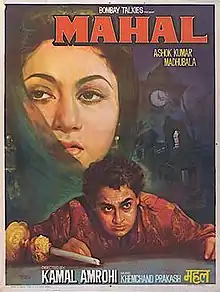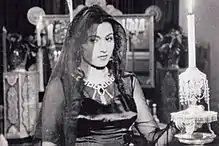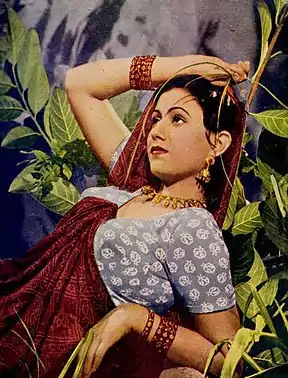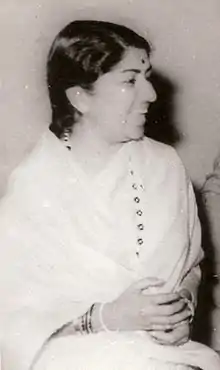Mahal (1949 film)
Mahal (transl. "Mansion") is a 1949 Indian Hindustani-language film directed by Kamal Amrohi, produced by Bombay Talkies and starring Ashok Kumar and Madhubala. Mahal — India's first reincarnation thriller film — revolves around a man who moves into an ancient mansion and learns about his previous life. Things take a turn when he gets visions of a woman claiming to be his lover.[3]
| Mahal | |
|---|---|
 Film poster | |
| Directed by | Kamal Amrohi |
| Produced by | Ashok Kumar Savak Vacha |
| Written by | Kamal Amrohi |
| Screenplay by | Kamal Amrohi |
| Story by | Kamal Amrohi |
| Starring | Ashok Kumar Madhubala |
| Music by | Khemchand Prakash (lyrics Nakshab Jaarchavi) |
| Cinematography | Josef Wirsching |
| Edited by | Bimal Roy M. Shanker R. M. Tipnis |
Production company | |
| Distributed by | Bombay Talkies |
Release date |
|
Running time | 165 min. |
| Country | India |
| Language | Hindustani |
| Budget | est. ₹9 lakh (est. ₹12.1 crore as of 2016)[1] |
| Box office | est. ₹1.45 crore (est. ₹198 crore as of 2016)[2] |
Bombay Talkies studio made Mahal on a modest budget, for it was suffering with major losses at the time. Amrohi, who made his directorial debut with the film, faced difficulty casting the female lead in the film. After being turned down by many major female stars, then fledgling actress Madhubala was put on the board to play a spirit. The film took a relatively long time filming, and while it was being made, it was ridiculed by film-related magazines who described it as a "huge failure".
After several delays, Mahal was released in theatres in October 1949. Despite mixed-to-negative critical reviews, it proved to be hugely popular among the audience and paved the way for Indian gothic fiction. The film's success also launched Madhubala and playback singer Lata Mangeshkar, who had lent her voice to three songs, into super-stardom. Moreover, it turned out to be the biggest hit for Bombay Talkies, though it was shut down only a few years after Mahal's release.
Long after its release, Mahal continues to "haunt" audiences and is considered a cult classic. Hailed as one of the most successful and influential films of Indian cinema, the film found a place in the British Film Institute's list of "10 great romantic horror films" and Scoopwhoop's of "14 Bollywood Horror Movies That You Just Can’t Watch Alone".[4][5]
Plot
Mahal is a story of reincarnation and a ghost story. In Allahabad, there is a beautiful abandoned palace. When a new owner, Hari Shankar (Ashok Kumar), comes to live in this palace, the old gardener narrates the story of incomplete love.
40 years ago, a man built it and his lover, Kamini (Madhubala), began to live in it. She would wait all day long for the man to come to her at midnight, but he always left before it was morning. One stormy night, the man's ship sank and he drowned. Before leaving Kamini, he tells her that their love will never fail. A few days later, Kamini also died.
When Shankar goes to a bedroom, a photograph falls from the wall and Shankar is astonished to find the man in the photograph looks exactly like him. Then, a woman is heard singing and Shankar follows her voice. He finds her sitting in a room, but she flees when she sees him. Shankar's friend Shrinath (Kanu Roy) arrives and Shankar expresses suspicion on his being the man of the incomplete love story in a previous life. Shrinath tries to calm him, but then the woman reappears. They follow her to the terrace, where she jumps off into water and the two men find nothing when they look down. The next day, Shankar heads back to Kanpur. At Naini, he gets off from a train and goes to the palace. Kamini tells him that she is real, but Shrinath interferes and warns Shankar that she will draw him to death. The ghost appears again and tells Shrinath to stay away from them. Enraged, Shrinath tries to shoot her but fails. Kamini tells Shankar that if she could enter into a body of a woman whom Shankar likes, she could return to life. She tells Shankar to see the gardener's daughter's face to check if she's beautiful and he can accept Kamini in that face. Meanwhile, Shankar's father arrives after hearing everything from Shrinath and takes him home. Shankar marries Ranjana (Vijayalaxmi). He decides to move far away with his wife in order to forget Kamini. After two years, a disturbed Ranjana wanting to know where Shankar goes every night, follows him when he goes to meet Kamini. Kamini tells him to kill the gardener's daughter so that she can use her body. Knowing everything, Ranjana drinks poison and goes to police station to give a deathbed confession against Shankar of betrayal and poisoning her. Shanker is submitted to the court and the daughter of the gardener, Asha, is also called upon there being accused of the cause of distance between Shankar and Ranjana. Later Asha is revealed to be Kamini. She then accepts that she has played Kamini because she had fallen in love with the man in the photograph, who looks like Shankar. But Shankar is sentenced to death. Later, the police come to know about Ranjana's letter and free Shankar. Shankar rushes to Shrinath's place but dies. The credits roll as a grieving Kamini and Shrinath walk away.
Cast

Many established actresses and new faces were screen-tested for the coveted female lead. The part was written with the then-reigning superstar, Suraiya in mind. However, after two screen tests, the fledgling Madhubala, only 16 at the time, was selected. The film was key in defining her screen persona and establishing her as one of the most successful as well as illustrious actresses of the 1950s and an iconic actress of Indian cinema.
- Madhubala as Kamini/Asha
- Ashok Kumar as Hari Shankar
- M. Kumar as Hari Shankar's father
- Vijayalaxmi as Ranjana
- Kanu Roy as Shrinath
- S. Nazir
- Eruch Tarapore
- Sheela Naik
- Leela Pandey
- Neelam
- Kaneez
- Jagannath
- Mohsin
- Laxman Rao
- S.A. Baker
- Ramastri
- Raja Salim
Soundtrack
For the lyrics written by Nakshab Jaarchavi for all the songs of the film, the music of the songs was composed by Khemchand Prakash. Tun Tun was initially offered to sing "Aayega Aanewala", but she refused the offer because of her contract with Kardar Productions.[6]
- "Aayega Aanewala" - Singer: Lata Mangeshkar
- "Chun Chun Gunguruva Baje Jhumba" - Singers: Rajkumari, Zohrabai Ambalawali
- "Ghabrakar Ke Jo Hum Sir Ko Takraayan" - Singer: Rajkumari
- "Dil Ne Phir Yaad Kiya" - Singer: Lata Mangeshkar
- "Main Wo Hansi Hun Lab Pe Jo Aane Se Rah Gayi" - Singer: Rajkumari
- "Ek Teer Chala Dil Pe Laga" - Singer: Rajkumari
- "Mushkil Hai Bahot Mushkil" - Singer: Lata Mangeshkar
Themes
The movie was a groundbreaking supernatural suspense thriller and one of the earliest known films dealing with reincarnation. Mahal became one of the biggest box office hits of 1949 in India [7] and paved way for Indian gothic fiction.[8]
Box office
Mahal was the third highest-grossing film of 1949 and was declared a blockbuster at the box office. It grossed ₹1.45 crore, including a nett of ₹0.8 crore[2] at the end of its initial theatrical run. It was also the tenth highest-grossing film of its decade (1940-49).[2] Adjusted for inflation, its gross was equivalent to ₹198 crore in 2019, and remains one of the hundred highest-grossing Indian films in the history to this time.[9]
Influence
The success of Mahal played a major role in the career developments of playback singer Lata Mangeshkar and lead actress Madhubala, as both of them were struggling to get a big break in the film industry. Mahal remained Madhubala's highest-grossing release for the next six years till Mr. & Mrs. '55 (1955), and Mangeshkar often cited "Aayega Aanewala" as one of her favourite songs.
Bimal Roy, who was the editor for Mahal, would later go on to direct Madhumati,[8] which itself went on to become the source of inspiration for many later works dealing with the theme of reincarnation in Indian cinema, Indian television, and perhaps world cinema. Many of its themes were repeated in the Hindi film Karz (1980),[10] which was remade several times: as the Kannada film Yuga Purusha (1989), the Tamil film Enakkul Oruvan (1984), and Om Shanti Om. [11][12]
See also
References
- Roshmila Bhattacharya (6 May 2013). "Testing times for Madhubala". Pune Mirror. Archived from the original on 2 July 2013. Retrieved 10 May 2013.
- "Boxofficeindia.com". 16 October 2013. Archived from the original on 16 October 2013. Retrieved 8 September 2020.
- "Testing times for Madhubala". Pune Mirror. 6 May 2013. Retrieved 8 December 2020.
- Blyth, Michael (22 May 2015). "10 great romantic horror films". BFI. Retrieved 30 March 2016.
- Kurian, Danny (16 May 2015). "14 Bollywood Horror Movies That You Just Can't Watch Alone". www.scoopwhoop.com. Retrieved 8 December 2020.
- Manish Gaekwad (24 March 2016). "Redemption song: 'Afsana Likh Rahi Hoon' by Tun Tun". Thereel.scroll.in. Retrieved 30 March 2016.
- Mahal (1949) Archived 13 January 2008 at the Wayback Machine Classic Films at upperstall
- Mishra, Vijay (2002), Bollywood cinema: temples of desire, Routledge, pp. 49–57, ISBN 0-415-93014-6
- "Biggest Blockbusters Ever!". web.archive.org. 22 April 2006. Retrieved 24 January 2021.
- Doniger, Wendy (2005), "Chapter 6: Reincarnation", The woman who pretended to be who she was: myths of self-imitation, Oxford University Press, pp. 112–136 [135], ISBN 0-19-516016-9
- Ashanti nags Om Shanti Om Archived 24 October 2007 at the Wayback Machine Mumbai Mirror, 7 August 2008.
- Shah Rukh, Farah Sued: Writer Claims SRK stole his script for Om Shanti Om Archived 13 April 2009 at the Wayback Machine

